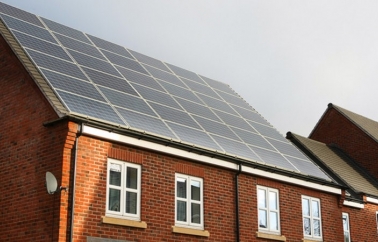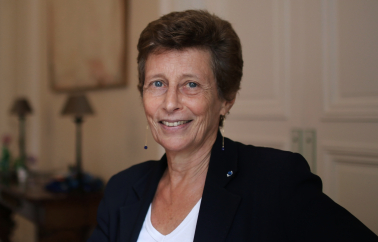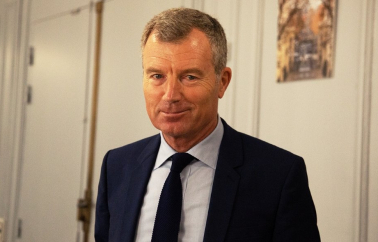
Climate Commissioner: Age of traditional energy consumers ‘almost over’ ( Source Euractiv.com)
Climate Commissioner: Age of traditional energy consumers ‘almost over’
By James Crisp | EurActiv.com
Tuesday June 14th 2016
Commissioner Cañete will declare the age of traditional energy consumption 'almost over' today.
This article is part of a special report series: Consumers, regulators and energy efficiency in buildings
EXCLUSIVE / The age of traditional energy consumers is almost over, Climate Commissioner Miguel Arias Cañete will say today (13 July), before outlining plans for Europeans to take control of their energy use and production.
Cañete is speaking at the opening conference of the European Commission backed Sustainable Energy Week in Brussels this morning.
The Commissioner will also highlight possible plans for a bloc-wide definition of energy poverty and bolstered reporting of the issue as part of the plans for oversight of the Energy Union project.
He will speak alongside Commission Vice-President Jyrki Katainen, who is expected to announce measures to funnel risk guarantees from the multi-billion euro Juncker Plan towards energy efficiency projects
“We want to empower citizens to take ownership of the energy they consume and produce,” Cañete will say, “That means incentivising citizens, energy co-operatives and local authorities to become active market players in their own right.”
“Ultimately that is what has to define our energy transition; consumers that take control of their energy consumption. In my view, when it comes to energy the age of the traditional consumer is almost over.”
Vision
Cañete will outline his vision of the “21st Century energy consumer”, describing him or her as the “focal point” for the shift to a more sustainable future.
“Automation of demand response must develop as a market instrument to allow consumers to tweak and optimise their energy use throughout the day,” he will say.
But he will warn;
millions of Europeans rely on century old analogue metering and are spending 15% more on energy than five years ago;
price signals are not passed onto consumers, meaning consumption stays the same;
that there are still very limited incentives for self-generation and consumption.
“Our job is to facilitate the transition to a new, flexible, clean energy system that provides sustainable and affordable energy to all and encourages innovation at every turn,” he will say.
“I cannot overstress how important empowering consumers will be in the energy transition.”
The Commission will consider how to improve the clarity and frequency of consumption information and develop minimum EU-wide information standards for bills, he will tell delegates.
Online consumption informative can reduce energy use by 8% but the data is too infrequent and confusing to be really useful, he will say.
The Commission will also support the ongoing roll out of smart meters throughout Europe, as well as connected devices and new technology such as the Internet of Things.
“Buildings could even produce more energy than they use,” Cañete will say in a reference to measures such as putting solar panels on roofs.
Energy poverty
An estimated 54 million Europeans suffer from energy poverty, according to a European Commission analysis, which blames rising prices, low income and energy inefficient homes for forcing people to choose between eating or heating.
“Being more sustainable and energy efficient will be essential in these situations,” Cañete will say before demanding “special efforts” from member states to address the problem.
“During this energy transition we will not leave anyone behind as move into a new era,” he will say.
The Commissioner will announce that the Commission is considering;
Developing an EU-wide definition of energy poverty,
Boosting national reporting on the problem as part of the plans for Energy Union oversight;
Creating ‘an energy poverty observatory’ to boost awareness.
Buildings and regulation revamp
Buildings are responsible for 40% of Europe’s energy consumption and 70% of the building stock is inefficient.
“This is a priority area for us,” Cañete will say, “Just consider that two third of our buildings were built before energy performance standards were limited or non-existent.”
The Energy Performance of Buildings Directive will be updated in Autumn. A new Smart Financing for Smart Buildings initiative will help double renovation rates to above 2% annually by 2020.
The Commission’s Energy Union strategy is its response to the twin challenges of boosting energy security and climate change.
Launched last year, it envisioned an interconnected EU single market for energy based on gas and renewables.
In Autumn the Commission will update and review its whole range of energy legislation to drive the bloc towards cleaner energy.
That shift is given greater urgency by the EU’s signing up to the Paris Agreement to cap global warming, and by EU leaders’ backing of the 2030 climate and energy targets.
“If 2015 was about making ambitious commitments, 2016 is about making ambitious policies to keep pace with those commitments,” Cañete will say, according to documents obtained by EurActiv.com.
The Commission will put its 27% 2030 renewables target into legislation with its revision of the Renewable Energy Directive at the end of the year. A new electricity market design will attempt to boost integration of renewables and respond to more flexible and active demand.
“But underpinning all of those efforts is our drive to be more energy efficient,” Cañete will say, “With climate change as it is we cannot afford to waste energy any more than we can afford to waste food or water.”
The revised Energy Efficiency Directive (EED) will set out “a path to meeting and hopefully surpassing” the at least 27% increase over 1990 levels in efficiency called for by the 2030 targets.
Earlier iterations of the EED and Energy Performance in Buildings Directive have been dogged by poor implementation at national level. Cañete will this morning promise to step up enforcement of the existing legislation.
Background
Sustainable Energy Week is a Commission-backed series of conferences, debates and discussion in Brussels.
It provides an opportunity for industry, NGOs, policymakers at all levels of government, and other stakeholders to feed into officials’ thinking.
The dominant theme will be how to incentivise consumers to help build the Energy Union, which currently remains a plan. Autumn will see the first fresh legislation to give it a grounding in regulatory reality.
Energy Union will cut across a number of policy sectors including energy, transport, research and innovation, foreign policy, regional and neighbourhood policy, trade and agriculture, according to the EU executive's plans.
Plans for the Union have developed beyond questions of security of supply to encompass issues such as fighting climate change.
The Renovate Europe campaign says that, thanks to modern technology, buildings' energy demands can be cut by 80%. But, it adds, in order for that to happen, there needs to be an effective regulatory and legislative framework in place.
Timeline
Autumn 2016: Revision of Energy Efficiency Directive and Energy Performance of Buildings Directive
End of 2016: Revision of Renewable Energy Directive



